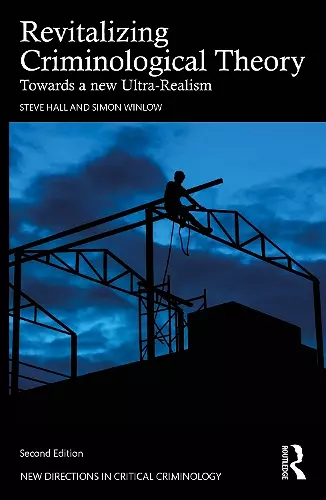Revitalizing Criminological Theory
Advances in Ultra-Realism
Steve Hall author Simon Winlow author
Format:Paperback
Publisher:Taylor & Francis Ltd
Publishing:30th May '25
£36.99
This title is due to be published on 30th May, and will be despatched as soon as possible.

The second edition of Revitalizing Criminological Theory is a substantial revision and expansion of the first edition. Ultra-realism is a unique school of criminological thought currently establishing itself in the discipline despite resistance from traditional schools. The second edition still provides the undergraduate and postgraduate student reader with an invaluable guide to existing schools of thought and their roots in politics and philosophy, but with updated commentary on their intellectual flaws.
In the first edition, Hall and Winlow introduced a number of important new concepts that laid the foundations for an alternative theoretical framework and research programme in criminology. In three additional chapters written specially for this edition they introduce further concepts and substantive revisions to the theoretical framework. They also outline and discuss in detail the growing body of award-winning criminological projects conducted by a new generation of researchers who have adopted and mobilised ultra-realist thinking over the past ten years. During this period of time ultra-realism has also made significant progress towards its primary objectives of understanding human motivations, constructing insightful representations of reality and answering the fundamental zemiological question of why some human beings risk inflicting harm on others to further their own interests or achieve various ends. The philosophical and psychosocial approaches outlined in the first edition are now significantly advanced and able to offer a more detailed answer to this question and a convincing alternative to the traditional paradigms of conservatism, neoclassicism and left liberalism. Ultra-realism is now in a position to make some substantive contributions to the debate on the depth of political intervention required to get serious about reducing the impact of crime and harm on the lives of ordinary people.
This book is essential reading for academics and students engaged in the study of criminology, sociology, social psychology, the philosophy of social science and the history of crime.
Books like this come along once in a generation. Hall and Winlow salvage the better ideas of the past and, in a remarkable multi-disciplinary synthesis backed up by ten years of empirical work by ultra-realist researchers, produce new concepts that lay the foundations for a twenty-first century criminological paradigm. Finally, the former rendezvous discipline of criminology comes of age with its own ideas.
Sabbirah Osman, Arden University, U.K.
Hall and Winlow’s demolition of the past’s exhausted criminological concepts and today’s rather weak attempts to undermine their project is brutal and sometimes funny, but it is always effective. Expertly surveying the landscape and carrying forward the few precious ideas worth keeping, this is a necessary turning over of the soil for a new season’s growth. A brilliant paradigm shift.
Donal McIntyre, Writer and Broadcaster, U.K.
Few working in the social sciences today can match Hall and Winlow for their bravery, insight and sheer intellectual quality. Anyone interested in actually trying to explain the reality of crime and harm today and must now embrace the new ultra-realism.
Professor Danielle McDermott, Leeds Trinity University, U.K.
In this significantly extended second edition, Hall and Winlow deepen ultra-realism’s theoretical foundations. The breadth and depth of their scholarship is breathtaking. A genuine new dawn for criminology, a green light for new research and theorisation and a must-read for all criminologists.
Professor Elizabeth Yardley, Birmingham City University, U.K.
Don’t be dissuaded by those who seek to defend the prevailing consensus. Anyone interested in the future of criminology must now open themselves up to the ultra-realist framework.
Tammy Ayres, Leicester University, U.K.
Any criminologist who has made the mistake of ignoring ultra-realism’s development over the past ten years will be impressed by its strong yet flexible theoretical foundations and the award-winning research it has inspired. The sections on subjectivity are stunning. Ultra-realism’s placement of today’s crimes and harms in their broader economic and cultural contexts does not achieve closure, but it provides criminology with a unique and sophisticated platform for debate over the coming years.
Professor Georgios Antonopoulos, Northumbria University, U.K.
The first edition of Revitalizing Criminological Theory posed a series of critical questions and provocations for criminologists of all stripes. Unfortunately, the conservative oligarchs and liberal guardians who patrol the parameters of what is seen as acceptable theoretical criminology failed to take up the challenges outlined by the new ultra-realism. Now, ten years on, and Hall and Winlow have returned with a significantly revised and extended second edition that drives a coach and horses through many of criminology’s fatigued theories and exhausted concepts. But Revitalizing Criminological Theory is no simple act of wanton disciplinary destruction. Expertly surveying the cultural and economic landscape, Hall and Winlow up sticks from the encampments of the past with a small bag of concepts carefully chosen for their value. Melding them with recent ideas from associated disciplines and also producing their own, they provide us with the building blocks of a new and distinct criminological paradigm.
Professor Keith Hayward, Copenhagen University, Denmark.
With its archaic assumptions, its dead ends and complicity with the orders of oppression, it is a debatable proposition whether criminological theory merits rehabilitation or wholesale abandonment. In this volume’s first edition, Steve Hall and Simon Winlow heartily sided with the former, expertly charting the twists and turns of the discipline’s development, while marking along the way, points for their own theoretical interventions. A decade on, now Ultra-Realism stands on its own, offering a dynamic riposte to many of the field’s taken for granted assumptions. Continuing to advance Ultra-Realist theory, the second edition again proves Hall and Winlow to be two of criminology’s most innovative and intrepid thinkers. Their rigorous assessment of criminology’s past, its present and the prospects for its future, demands to be taken seriously, whether student or skeptic.
Professor Travis Linneman, Kansas State University, U.S.A.
ISBN: 9781041034933
Dimensions: unknown
Weight: 180g
404 pages
2nd edition